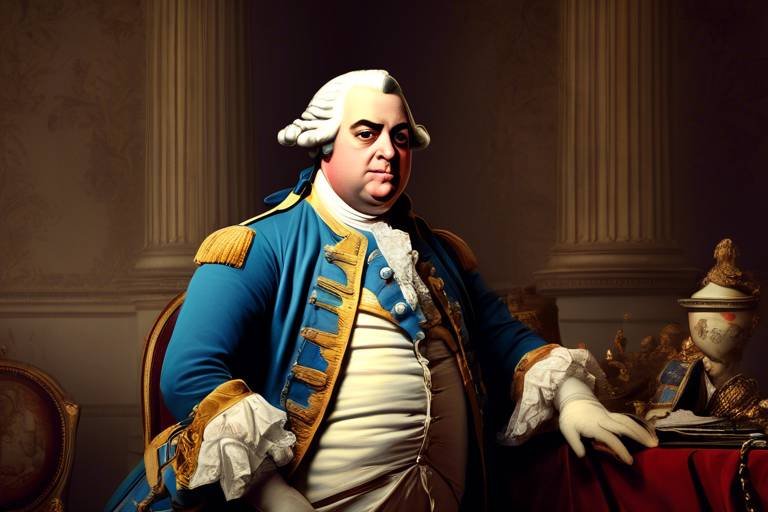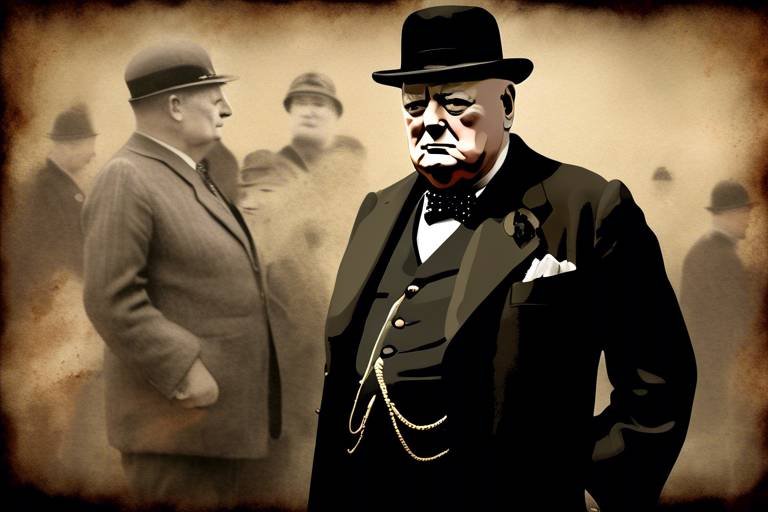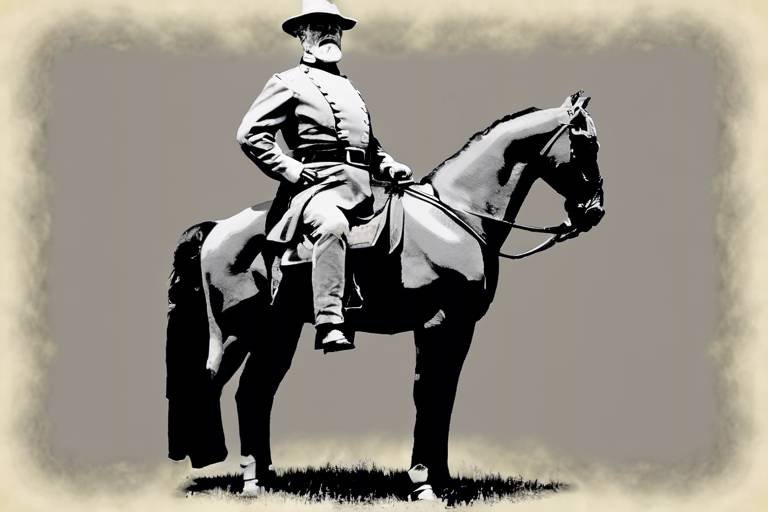Khalid ibn al-Walid: The Sword of Allah
Known as the Sword of Allah, Khalid ibn al-Walid was a legendary military commander and a close companion of the Prophet Muhammad. His life and achievements continue to inspire generations with his strategic brilliance and significant contributions to the early Islamic conquests.
Born in the Quraysh tribe of Mecca, Khalid grew up with a strong sense of honor and courage. Before his conversion to Islam, he was known for his exceptional skills in warfare and leadership. However, it was his pivotal conversion to Islam that transformed him into one of the most celebrated military leaders in Islamic history.
Throughout his military career, Khalid demonstrated unparalleled prowess in battles and military strategies. His innovative tactics, decisive leadership style, and strategic decisions led to numerous victories for the early Muslim armies, solidifying his reputation as a brilliant military strategist.
One of Khalid's most notable achievements was his role in the conquest of Mecca. This historic event marked the triumph of Islam in the Arabian Peninsula and showcased Khalid's military prowess and unwavering faith in the face of adversity.
Another significant victory attributed to Khalid was the Battle of Yarmouk. His strategic brilliance and exceptional leadership skills played a crucial role in defeating the Byzantine forces, paving the way for the Islamic conquest of Syria.
Khalid ibn al-Walid's legacy continues to endure, with his impact on Islamic military strategies being felt to this day. Revered as the Sword of Allah, he is remembered for his remarkable achievements in defense of Islam and his unwavering commitment to the cause.
When analyzing Khalid's leadership qualities, one cannot overlook his courage, decisiveness, and tactical acumen. These qualities have continued to inspire leaders and military strategists worldwide, setting a benchmark for effective leadership in times of conflict.
Various historical accounts and narratives provide insight into Khalid ibn al-Walid's life and military campaigns, shedding light on his character, achievements, and contributions to early Islamic history. His legacy remains a source of inspiration for those studying the art of warfare and leadership.

Early Life and Conversion
Khalid ibn al-Walid, also known as the Sword of Allah, was born into the prominent Quraysh tribe in Mecca, a city central to the Arabian Peninsula. His early life was marked by his prowess in warfare and leadership skills, earning him the title of Al-Saif (the Sword) even before his conversion to Islam.
Before embracing Islam, Khalid was a fierce opponent of the Prophet Muhammad and the early Muslims. His military acumen and strategic brilliance were evident in his conflicts with the Muslim community, where he displayed unmatched skill in battle tactics and command.
However, everything changed when Khalid ibn al-Walid witnessed the strength of Islamic unity and the message of the Prophet Muhammad. His conversion to Islam marked a turning point in his life, transforming him from a formidable adversary to a devoted companion of the Prophet.
Upon embracing Islam, Khalid's military expertise was now guided by faith and a sense of duty towards the burgeoning Muslim community. His conversion not only altered his allegiance but also showcased his unwavering commitment to defending the nascent Islamic state against its adversaries.
Through his conversion, Khalid ibn al-Walid exemplified the transformative power of faith and the profound impact it can have on an individual's life trajectory. His journey from a skilled warrior to a revered military leader underlines the significance of spiritual awakening and conviction in shaping one's destiny.

Battles and Military Strategies
When delving into the realm of battles and military strategies, the name of Khalid ibn al-Walid shines brightly as a beacon of tactical brilliance and strategic acumen. His prowess on the battlefield and innovative military tactics have left an indelible mark on the annals of history. Khalid's approach to warfare was not merely about brute force but a carefully orchestrated symphony of maneuvers and calculated risks.
One of Khalid's most renowned battles was the Battle of Mu'tah, where he displayed exceptional leadership skills and strategic foresight. Despite facing overwhelming odds, Khalid's tactical brilliance allowed the Muslim army to retreat in an organized manner, showcasing his ability to turn a potential defeat into a strategic withdrawal.
Furthermore, Khalid's military strategies were not limited to conventional warfare. In the Battle of Walaja, he utilized the terrain to his advantage, employing innovative tactics such as the "mobile guard" to outmaneuver the enemy forces. This unconventional approach caught the Sassanid army off guard, leading to a decisive victory for the Muslims.
Moreover, Khalid's ability to adapt to changing circumstances was evident in the Battle of Ullais, where he successfully countered the Sassanid cavalry's superior numbers by deploying his forces in a defensive formation. This strategic decision not only neutralized the enemy's advantage but also paved the way for a resounding triumph for the Muslim army.
In essence, Khalid ibn al-Walid's military strategies were characterized by a blend of innovation, adaptability, and tactical brilliance. His legacy as a master tactician and a formidable military commander continues to inspire military leaders and strategists across the globe, solidifying his reputation as the Sword of Allah.

Conquest of Mecca
The stands as a defining moment in the life of Khalid ibn al-Walid, showcasing his military prowess and unwavering faith in the triumph of Islam. Khalid played a pivotal role in the conquest of Mecca, a significant event that marked the ultimate victory of Islam in the Arabian Peninsula. His strategic brilliance and leadership were instrumental in the success of this conquest, solidifying his reputation as a formidable military commander.
During the conquest of Mecca, Khalid demonstrated his exceptional tactical acumen by devising innovative strategies that outmaneuvered the Quraysh forces. Despite facing formidable opposition, Khalid's unwavering determination and steadfast belief in the righteousness of his cause propelled the Muslim armies to victory. His ability to inspire and lead his troops with courage and conviction played a crucial role in the successful outcome of the campaign.
One of the most remarkable aspects of Khalid's leadership during the conquest of Mecca was his ability to maintain discipline and unity among the diverse Muslim forces. By fostering a sense of camaraderie and shared purpose, Khalid instilled a sense of cohesion that proved vital in overcoming the challenges posed by the Quraysh. His strategic foresight and decisive actions during the campaign were instrumental in securing Mecca for the burgeoning Islamic empire.
The conquest of Mecca not only showcased Khalid's military genius but also highlighted his unwavering faith in the divine mission of Islam. Khalid's dedication to the cause of spreading the message of Islam and establishing the authority of the Prophet Muhammad was unwavering, earning him the title of the Sword of Allah. His pivotal role in the conquest of Mecca solidified his legacy as one of the greatest military leaders in Islamic history, revered for his exceptional contributions to the early Islamic conquests.

Victory at Yarmouk
Victory at Yarmouk was a pivotal moment in Khalid ibn al-Walid's military career, showcasing his strategic brilliance and leadership prowess. The Battle of Yarmouk, fought in 636 CE between the Muslim Arab forces under Khalid's command and the Byzantine Empire, marked a significant turning point in the early Islamic conquests.
The battle, known for its fierce intensity and strategic maneuvers, saw Khalid implementing innovative tactics that outmaneuvered the larger Byzantine army. His ability to adapt to changing battlefield conditions and exploit the weaknesses of the enemy played a crucial role in securing a decisive victory for the Muslim forces.
One of Khalid's most notable strategies at Yarmouk was the use of a mobile reserve force, which he deployed at critical moments to reinforce weakening positions and launch surprise attacks on the Byzantine flanks. This tactic proved instrumental in breaking the enemy lines and causing chaos in their ranks.
Despite being outnumbered, Khalid's leadership inspired his troops to fight with unwavering determination and unity, emphasizing the importance of discipline and cohesion in achieving victory on the battlefield. His ability to instill confidence in his soldiers and lead by example set him apart as a formidable military commander.
The outcome of the Battle of Yarmouk was a resounding success for the Muslim forces, resulting in the defeat of the Byzantine army and the eventual conquest of Syria. Khalid's strategic acumen and tactical brilliance in this historic battle solidified his reputation as one of the greatest military minds of his time, earning him the title of the Sword of Allah.

Legacy and Influence
Exploring the life and achievements of Khalid ibn al-Walid, a renowned military commander and companion of the Prophet Muhammad, known for his strategic brilliance and significant contributions to early Islamic conquests.
Khalid ibn al-Walid's legacy as the Sword of Allah continues to resonate through the annals of history, leaving an indelible mark on the world of military strategy and leadership. His unwavering commitment to Islam and his unparalleled military prowess have solidified his position as a legendary figure in Islamic history.
One of the key aspects of Khalid's influence lies in his innovative military strategies that revolutionized warfare during his time. His ability to adapt to changing battlefield conditions, devise unconventional tactics, and outmaneuver his opponents with precision and agility set him apart as a master tactician.
Moreover, Khalid's leadership qualities, characterized by his courage, decisiveness, and strategic vision, serve as a guiding light for leaders across generations. His ability to inspire and motivate his troops, instilling in them a sense of unwavering loyalty and dedication, exemplifies the true essence of leadership.
Through his remarkable achievements in defense of Islam, Khalid ibn al-Walid has left an enduring legacy that transcends boundaries of time and geography. His name evokes admiration and respect among Muslims worldwide, symbolizing the epitome of bravery, loyalty, and devotion to the faith.
As a military strategist par excellence and a devoted servant of Islam, Khalid ibn al-Walid's legacy continues to inspire scholars, historians, and military leaders, serving as a timeless testament to the power of faith, determination, and strategic acumen.

Sword of Allah
Khalid ibn al-Walid, revered as the , earned this title through his exceptional military prowess and unwavering commitment to the defense of Islam. His strategic brilliance and leadership on the battlefield were so remarkable that he became synonymous with the concept of a warrior fighting in the name of Allah.
Imagine a sword that cuts through the darkness of ignorance and oppression, bringing light and justice to the believers. That was Khalid ibn al-Walid, a symbol of strength and determination in the face of adversity, a weapon wielded by divine guidance to protect the Muslim community from external threats.
Just as a sword is forged in the hottest fires and shaped by skilled hands, Khalid's character was honed through years of experience, challenges, and victories. His legacy as the serves as a reminder of the power of faith, courage, and strategic thinking in the pursuit of noble goals.

for his remarkable achievements in defense of Islam.
Known as the Sword of Allah, Khalid ibn al-Walid earned this title for his remarkable achievements in defense of Islam. His unwavering dedication to protecting the Muslim community and spreading the message of Islam through military conquests solidified his legacy as one of the greatest military leaders in Islamic history. Khalid's strategic brilliance on the battlefield, coupled with his fierce loyalty to the Prophet Muhammad and the Islamic cause, set him apart as a formidable commander who led his troops to numerous victories against formidable foes.

Leadership Qualities
When it comes to leadership qualities, Khalid ibn al-Walid exemplified a rare combination of courage, decisiveness, and tactical acumen that set him apart as a legendary military commander. His unwavering determination on the battlefield, coupled with his strategic brilliance, earned him the title of Sword of Allah among his contemporaries.
One of Khalid's key leadership qualities was his ability to inspire and motivate his troops, instilling in them a sense of unwavering loyalty and commitment to the cause. His charismatic presence on the battlefield served as a beacon of hope for the early Muslim armies, rallying them to victory in the face of overwhelming odds.
Moreover, Khalid's decisiveness in making split-second tactical decisions was unparalleled, often turning the tide of battle in favor of the Muslim forces. His strategic foresight and quick thinking allowed him to outmaneuver his opponents and secure decisive victories on the battlefield.
Additionally, Khalid's courage in the face of danger was legendary, as he fearlessly led his troops into the thick of battle, setting an example of bravery and valor for generations to come. His willingness to take calculated risks and lead from the front inspired admiration and respect among his comrades.
Furthermore, Khalid's ability to adapt to changing circumstances and innovate new military strategies showcased his versatility as a leader. Whether facing a formidable enemy or navigating complex battlefield terrain, he demonstrated a keen understanding of warfare that proved instrumental in securing victories for the early Muslim armies.
In essence, Khalid ibn al-Walid's leadership qualities not only shaped the course of early Islamic conquests but also continue to inspire leaders and military strategists worldwide. His legacy as the Sword of Allah serves as a testament to the enduring impact of his leadership and the indelible mark he left on Islamic history.

Historical Accounts and Narratives
When delving into the historical accounts and narratives surrounding Khalid ibn al-Walid, one is met with a tapestry of vivid descriptions and awe-inspiring tales that paint a picture of a military genius and a devout believer. Various sources, ranging from early Islamic chronicles to modern historical works, offer insights into Khalid's character, strategies, and pivotal role in shaping the early Islamic conquests.
One of the most renowned accounts of Khalid's military prowess comes from the Battle of Mu'tah, where he displayed unparalleled bravery and strategic acumen in the face of overwhelming odds. The vivid descriptions of his leadership on the battlefield and his unwavering commitment to the cause of Islam have solidified his reputation as a legendary figure in Islamic history.
Furthermore, the narratives surrounding Khalid's conquest of the Persian Empire shed light on his ability to adapt to diverse terrains and enemy tactics, showcasing his versatility as a military commander. His decisive victories against the Sassanid forces and the subsequent expansion of the Islamic empire stand as testaments to his military genius and unwavering faith.
Additionally, historical accounts often highlight Khalid's close relationship with the Prophet Muhammad, depicting him as a trusted companion and a stalwart defender of the nascent Muslim community. His pivotal role in key battles such as Uhud and Khandaq underscores his unwavering loyalty to the Prophet and his commitment to the cause of Islam.
Overall, the historical accounts and narratives surrounding Khalid ibn al-Walid paint a vivid portrait of a military leader par excellence, a devout believer, and a key architect of early Islamic conquests. Through these accounts, one can glimpse into the life and legacy of a man whose strategic brilliance and unwavering faith continue to inspire generations of Muslims and military strategists alike.
Frequently Asked Questions
- Who was Khalid ibn al-Walid?
Khalid ibn al-Walid was a renowned military commander and companion of the Prophet Muhammad, known for his strategic brilliance and significant contributions to early Islamic conquests. He earned the title "The Sword of Allah" for his remarkable achievements in defense of Islam.
- What were Khalid's notable battles?
Khalid ibn al-Walid participated in several significant battles, including the conquest of Mecca and the Battle of Yarmouk. His innovative military tactics, leadership style, and strategic decisions led to decisive victories for the early Muslim armies.
- What was Khalid's legacy and influence?
Khalid's enduring legacy includes his impact on Islamic military strategies and his revered status among Muslims. His leadership qualities, such as courage, decisiveness, and tactical acumen, continue to inspire leaders and military strategists worldwide.



















